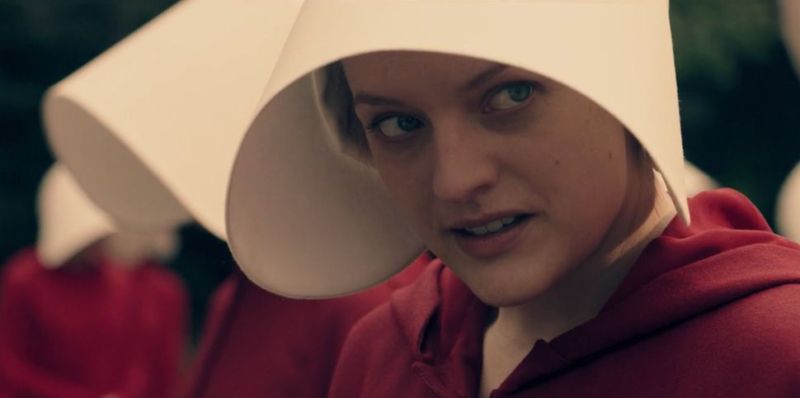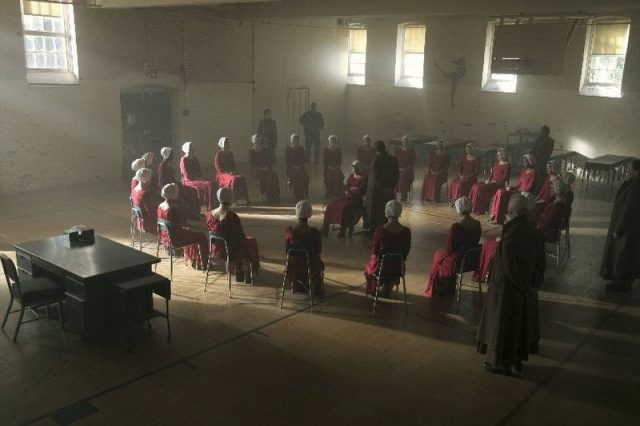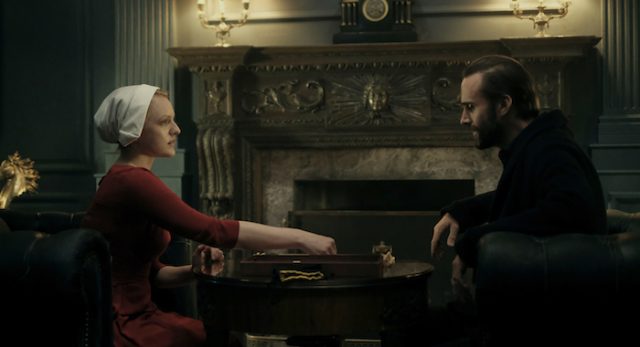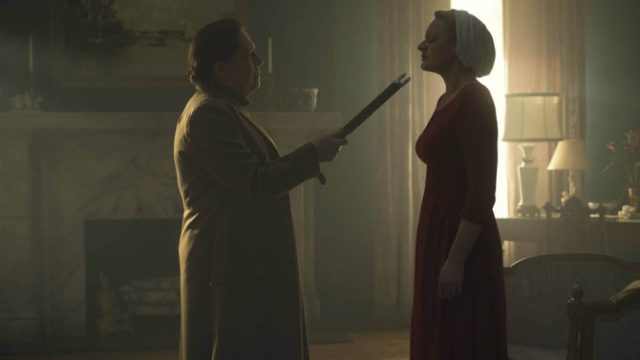
One of the most exciting new science fiction shows on the Web right now isn't exactly fun. The Handmaid's Tale, currently streaming its first three episodes on Hulu, may repulse you, incense you, or just make you cry. But like a good workout that makes your muscles burn, the hurt of watching this series eventually results in something great.
Based on the celebrated 1985 novel by Margaret Atwood, The Handmaid's Tale is a half-dystopia, half-fairy tale about what happens to the United States after a far-right religious group seizes control of the government. There are a few notable changes from the novel, but, for the most part, the series follows the events of Atwood's book faithfully.
We aren't quite sure how the new nation of Gilead was formed, but we hear bits and pieces about a war that has left "the colonies" a radioactive wasteland. Food is scarce, and an infertility epidemic is sweeping the world.
With precious few healthy babies being born, women who can reproduce are so valuable that the government rounds them up and turns them into "handmaids" who must reproduce for the good of their nation—and the new religious order. The result is an ugly scenario in which men become absolute rulers, women are male property, and "low ranking" people become what appear to be slaves.

Though it sounds unrealistic, the series convinces us that such a radical transformation would be easy under martial law. In one fell swoop, the Gilead government orders a shutdown of all credit cards with "F" on the accounts. Women's money is given to their husbands or male next-of-kin. All women are "let go" from their jobs, and militias are out in force to be sure it happens. Anyone who protests is gunned down. It's not hard to believe that a society facing massive atomic disaster, coupled with an infertility epidemic, would turn to these political extremes.
What's really stunning about The Handmaid's Tale isn't its evocation of a dark political future, however. It's the way we're drawn into the personal perspective of June, a book editor who paid very little attention to politics until one day her credit card stopped working. Because she's fertile, June is sent to a reeducation camp for handmaids. Eventually she's renamed "Offred" when she becomes the property of a man named Fred and his supposedly infertile wife. Other women aren't so lucky. The infertile are sent to die cleaning up toxic waste in the colonies. Lesbian "gender traitors" are hanged in public places, where their bodies are left on display for days.
The little things that matter
Through June's eyes, we see the thousands of tiny, creepy injustices—and shreds of hope—that constrict her world. We witness the horrific "ritual" where Fred tries to impregnate her while his wife watches in horror. We see what it's like to shop in a world where women are forbidden to read (all the brands have become brightly colored emoji). We share June's terror every time her mistress asks her to do something, and we feel her paranoia that the "Eye" of the surveillance state might discover that she isn't properly obedient. Friends can't be trusted; enemies might pop up and beat her at any moment.
Possibly one of the most affecting scenes is when Fred (a monstrously chivalrous Joseph Fiennes) tries to show that he's a good guy late one night by inviting her to his study alone. Handmaids are not allowed to spend time alone with their "commanders," so June is terrified when he first makes the secret invitation. Is he planning to rape her? Turn her in to the authorities? When Fred reveals his intentions are simply to play a game of Scrabble, he behaves as if their chaste date is a treat she should be grateful for. Constantly aware that he could turn on her at any time, June plays the game with trembling hands, while Fred just enjoys himself.

It's a perfect encapsulation of how a violently repressive regime like this can function on an everyday basis. June knows she's been enslaved and forced to have sex against her will, but Fred sees her situation as the proper place for a fertile woman. He's completely blind to the horrors she's enduring. After all, he is being a kind commander, offering his chattel a pleasant diversion. One person's grim meathook future is another's jolly nice evening.
Elizabeth Moss (Mad Men) is perfectly cast as June, evoking a character who is scared witless but still possesses a sly humor. June's wry voiceovers become satirical commentary on the sheer brutality of what we're seeing, cutting the tension without ever suggesting that things are going to be OK. Her best friend Moira from before the Gilead crackdown (Samira Wiley of Orange Is the New Black) is equally funny and intense. She copes with each new outrage by resisting—until everything is taken from her.

The first three episodes were directed by Reed Morano, who is also responsible for pitching the series' overall tone and direction. She has said in interviews that she worked hard to create a tone that hovers between fairy tale and one of Stanley Kubrick's darkly funny dystopias. It's a difficult feat to pull off, but she's done it. Partly that's because she knows when to stay in a scene and when to pull us out; we move between June's present situation as Offred and memories of her life before and during the Gilead coup.
Morano has also done an incredible job with the music, a mix of songs from the 80s and 2000s, which suggest that this story takes place in an alternate history that could have erupted out of our timeline at any point in the past 40 years. There is an ethereal remix of a Blondie song, played in odd wisps over a deadly riot, that is absolutely haunting.
The pleasures of dystopia
Atwood's novel The Handmaid's Tale shot up to the top of the Amazon bestseller list in the wake of the recent US election, right alongside 1984. It's clearly become a classic of the genre, something that people turn to when they fear that the future is about to crash and burn. Critics and fans have said endlessly over the past few months that The Handmaid's Tale feels "real" or "too much like what's happening right now."
Except it doesn't. As crazy as the US executive branch has gotten in recent months, we are still not living in a nation where women are slaves, gay people are hanged without trial, and militias open fire on peaceful marches. I'm not saying that those things couldn't happen, nor am I saying there's no reason to be afraid of them. My point is that The Handmaid's Tale has not suddenly become too realistic to function like a traditional science fiction dystopia, which is to say as a fantasy that warns us about what could happen in the worst case scenario.

The Handmaid's Tale feels relevant now because we're at a chaotic and dark time in US political history, where the future no longer seems certain. And I would argue that it is still pleasurable to watch, albeit difficult, because it asks the kinds of questions that are urgent at such times. What kind of country do we want to have? How easy would it really be for an extremist group to take over? What would it look like if the state took complete control over reproduction? How would we resist if all our civil rights were taken from us?
In fiction, we can contemplate these questions in a way we simply can't in a political debate. Fiction strips away our preconceptions, removes us from immediate arguments over taxes or Planned Parenthood, and allows us to consider the long road of history that transcends a single presidential term or even a single lifetime. Weirdly, this makes dystopian fiction a form of escapism. It's comforting to view today's congressional squabbles in the context of a much bigger picture, where the possible consequences of today's legal actions (and reactions) become clear.
For this reason, The Handmaid's Tale has come at the right time to entertain and divert us. But it also does what great storytelling always has: It invites us to step back from our entrenched ideas—whatever they are—and think about where they fit into a broader view of history. Could the ultra-authoritarian world of The Handmaid's Tale ever become our reality? It's up to us to decide.
The Handmaid's Tale is streaming on Hulu.
reader comments
397